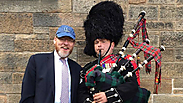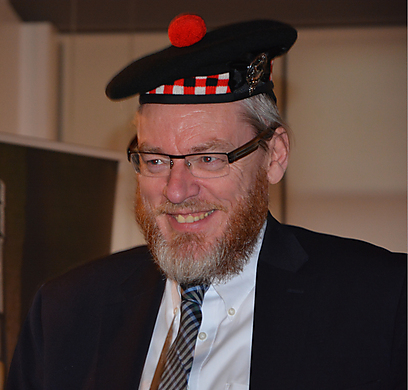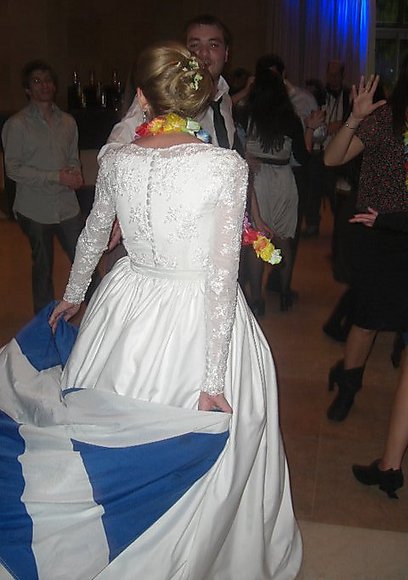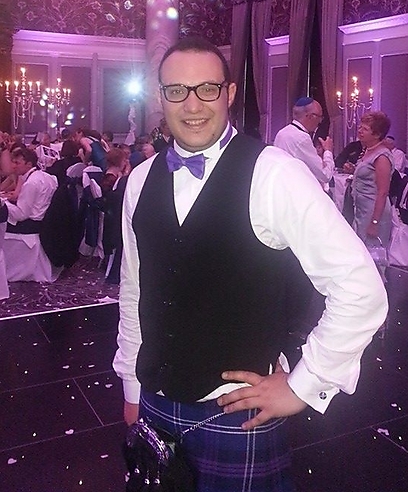
Scotland's Jews prefer to stay with England
While Jewish community leaders decide to remain neutral on historic referendum taking place Thursday, many believe independence will lead to a more anti-Semitic and anti-Israel Scotland.
A senior member of the small Scottish Jewish community told Ynet that the official decision made by the community leaders was not to favor one side over the other, but polls conducted in the country show that the majority of Jews are against splitting from Great Britain.
The referendum is being held on the backdrop of growing anti-Semitism in Scotland and repeated demands from the local parliament that England stop selling weapons to Israel. The Jewish community's fear, which is usually not expressed openly, is that these phenomena may increase if Scotland is declared an independent state.
Niva Afm, an Israeli living in Scotland, believes that beyond the Scottish pride and the national desire to "get back at England," there is no benefit in gaining independence.
"The result may be an economically weaker, anti-Semitic and pro-Islamic Scotland," she says. "The leader of the party promoting the referendum compared Israel to the Nazis, or was it to ISIS? In any event, the direction is pretty clear."
Growing anti-Semitism
David Kaplan, who was born in Scotland and lives in England today, believes that the Jews – unlike their leadership – are not afraid to express themselves, and most of them will vote against splitting from Britain.
"They have been very loud in the press and in the media, and firmly expressed an opinion against the Palestinian flag (which was raised in Glasgow in solidarity with the Palestinians)," he says.
But Kaplan, who graduated from the Edinburgh Academy and University of Glasgow, is also familiar with the alarming figures about a rise in anti-Semitism in Scotland. "There is no doubt that the flag affair came at a really bad timing in respect to the referendum issue, but the local community stood strong."
"The community isn't united this time, and that's a very good thing," Marc Livingston, a 26-year-old Jewish lawyer from Glasgow, told Ynet. He believes that "some will vote in favor of independence, and some won't. at the end of the day, it's a Scottish rather than a Jewish issue."
Livingston, who also wrote a column about the issue in the local press, doesn't think Scotland is suffering from anti-Semitism, and in his opinion neither is the Scottish National Party (SNP), which is behind the independence bid, or the ruling party, despite a series of moves it launched against Israel.
"They are a liberal left-wing party, which has shown solidarity towards the Palestinian people, whether rightfully or not," he says. "However, (party leader) Alex Salmond has always treated the Jewish community well and respects our contributions to the Scottish society. Unfortunately, the recent operation in Gaza led to a rise in the number of anti-Semitic incidents in Scotland, but that has nothing to do with the referendum."
Kaplan things otherwise. "For more than 25 years, the country's professional unions and the liberal left have been running a pro-Palestinian campaign," he argues. "I have watched numerous speeches by Parliament Member George Galloway against Israel."
A more 'leftist' Scotland
Rabbi Yehuda Yonah Rubinstein, a proud Scot who lives in New York, also says that SNP would be shocked by its definition as an anti-Semitic party, but that one cannot ignore the fact that anti-Israel actions are often used as a cover for anti-Semitism.

"There are ways to detect when the line between being anti-Israel and anti-Semitic has been crossed," says Rabbi Rubinstein, who has hosted programs on the BBC for years and has written eight books.
"Famous Irish statesman Conor Cruise O'Brien once said that if the person standing in front of you can't resist the temptation of comparing Jews to Nazis, you should know that you are talking to an anti-Semite. And I would add that if a person can only speak against Israel and only find flaws and shortcomings in Israel, while not being troubled by the much more problematic conduct of other countries, then you are talking to an anti-Semite.
"These two symptoms are shared by both sides of the debate: Both the independence supporters of SNP and others and its opponents, like the Scottish Labour. An independent Scotland means a leftist Scotland with a sweeping outlook against Israel, and another anti-Israel voice in international forums."
Ephraim Borowski, head of the Scottish Council of Jewish Communities (SCoJeC), said in an interview he gave in June that SCoJeC did not believe there was any threat to the Jewish community in light of the vote or any benefit from either option. "Just as we cannot take sides in an election, we cannot take sides in a referendum," he noted.
He added that he did not expect any damage to the structure of the Jewish community if Scotland were to become independent, noting that the Jewish communities in Scotland were already united under a different umbrella organization which sustained reciprocal relations with the Jewish communities.
Jewish community, a Scottish success story
During Operation Protective Edge, the Glasgow City Council's decided to fly a Palestinian flag in solidarity with Gaza's residents. Four local Scottish councils are taking part in an economic boycott on Israeli products, and if that were not enough, quite a few Scottish Parliament members are not hiding their radical opinions about Israel.

A local newspaper reported about an alarming rise in anti-Semitism in the country, but also about growing Islamophobia. Last week, the Scottish Church issued a statement joining condemnations against anti-Semitism and Islamophobia in the country, after local security forces reported that the number of anti-Semitic incidents in Scotland in August was similar to the number of anti-Semitic incidents in all of 2013.
The incidents included hate graffiti on synagogues, as well as threats against Jewish community members and officials via email and on the phone.
But things haven’t always been like this. Scotland's Jewish community is quite young. It was founded about 130 years ago by Jews who immigrated from Eastern Europe, refugees who fled bloody riots and anti-Semitism. For many of them, it was just another stop on their way to their final destination, the United States, but some settled in Glasgow and made a living off building furniture or peddling. The "Jewish story" quickly turned into a local success story.
The Scottish Jewish community made a special effort to assimilate into the local population. A wedding with a skullcap and a kilt is a common sight in the country.
If there was any discrimination in Glasgow in the past, it was mainly in the local golf clubs, which in the 1950s refused to take in Jews and Catholics and members. The local Jews opened their own golf clubs and took in whoever wanted to join.
In its glory days, the Jewish community included about 15,000 Jews in Glasgow alone. The numbers have shrunk significantly since then, and according to estimates there are currently 6,000 to 7,000 Jews living in Scotland. Most of the young members immigrate southward, to England. Few have immigrated to Israel in recent years.
"In case of independence, Scotland will grow to resemble its Celtic cousin, Ireland, in terms of the Israeli-Palestinian conflict," Rabbi Rubinstein concludes. "In any event, the country's Jews would be better off with a Scotland united with Britain than with an independent Scotland."
Moshe (Moish) Rubinstein contributed to this report.











